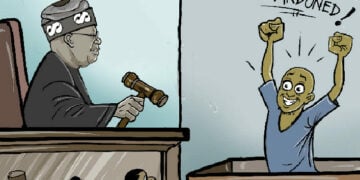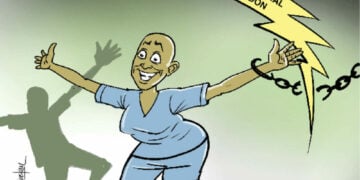30th September 2022, burkinabes, West Africans and the world was alerted to the news of yet again another coup d’état in Burkina Faso. Residents woke up to gunfire with an army captain eventually announcing that the military ruler, Paul-Henri Damiba, had been deposed and the constitution suspended. The military counter-coup was the second this year in the West African country. In January, Damiba had deposed President Roch Kabore, suspended the constitution, dissolved the government and the national assembly, and closed the country’s borders.
In the last three years, there have been seven successful coup attempts in Africa, raising concerns about the decline of democracy on the continent. A week after the January coup in Burkina Faso, soldiers struck in Guinea-Bissau another West African country. It was reported that armed men surrounded the government palace where the country’s President and Prime Minister were attending a cabinet meeting. After sketchy information and a lot of back and forth, it was learnt that there had been an attempted coup by the time the dust settled.
Last year in May, a coup was reported in Mali led by then Vice President Assimi Goïta. In the same year, Chad, Guinea and Sudan also recorded coups. Apparently, Africa and in particular the West African sub-region is currently facing a coup epidemic. Why the sudden resurgence of military takeovers? Why are there challenges to democratic stability across the continent? Perhaps the answer to these question lies in the country’s themselves.
It is quite unfortunate that a lot of African countries possess a cocktail of ingredients that seem to invite military coups. From ‘civilian dictatorships,’ pervasive corruption, greed, mismanagement to widespread poverty, has undoubtedly been triggers for coups on the continent. Recently in West Africa, the insecurity challenge posed by terrorist groups such as Boko Haram, and ISWAP have been fingered by many of the coup leaders as a major harbinger for their coups. This was the case during both coups in Burkina Faso this year.
Another dangerous development is that apparently, successful coups in one region or country seems to create a dangerous pretext for others to follow especially in the absence of real consequences. The African Union (AU) and the Economic Community of West African States (ECOWAS) have expressed their opposition to coups and sanctioned perpetrators. Sanctions have included travel bans, border closure and financial sanctions. From the reoccurrence of coups however it has become obvious that such sanctions aren’t enough.
These coups are also coming at a time when in many parts of the world democracy is being consolidated and has since become the best choice of governance. Dividends of democracy are being enjoyed by the citizenry in these countries and it has become unheard of the military to take power. In West Africa/Africa however, the sub-region and continent are still battling with the ghost of military coups that was the norm during the 1960s, 70s, 80s and early 90s in many parts.
One might argue that coups are not new to Africa. After most African countries gained independence in the mid to late 20th century, many of them witnessed takeovers of the government by the military. From Algeria to Angola, Cameroon to Central African Republic, were ruled at a point in their history by military rulers. In many cases, these military leaders turned despotic and ‘kleptocratic’ vampiricallysucking their country dry and aggressively intolerant to any form of opposition to their rule. Counter coups were mostly the only way these leaders could be unseated.
History has shown that these military regimes have proven to be no better than the civilian administration they toppled. Even though some celebrate the departure of unpopular civilian leaders, military coups are not usually good news. In many cases, there is often hope among the citizenry that the military regime will right the wrongs of its predecessor. However, after months into the regime it becomes clear that many of the problems the citizenry face still remains.
There are concerns also of external factors that have added to the recent surge in the militarization of politics on the continent. The increasing and diverse numbers of international actors who are active in the continent prioritizing their interests have been contributory factors. For instance, China, the continent’s largest trading partner, has a no-interference policy on the domestic affairs of African countries, as long as they are committed to long-term economic ties. This is seen favourably by many across the continent, with more African leaders wooed by China’s economic success on the global stage becoming increasingly convinced their countries should leave Western prescriptions for good governance and economic growth.
Russia, in recent times, has been expanding its influence politically and militarily across the continent. Russia has also been capitalizing on rising anti-French sentiments in many Francophone African countries. For Russia and China, the relationship is the priority, not an interest in democracy. As they increase their influence, it has begun to mimic the Cold War era where Africa becomes the proverbial grass that suffers when elephants clashes. However, it is not only China and Russia that are culpable. The Western powers led by the U.S seem to be in support of any coup on the continent that aligns to their interest.
Recall that the West in 2013 denied calling the military takeover in Egypt a coup and embraced General-turned-President Abdel Fattah el-Sisi’smilitary government. A similar trend was followed with the 2017 Zimbabwean coup. Happy to see Mugabe go, the West ignored that his resignation had come through the barrel of a gun. For France, the Western-European country continues to pursue its traditional strongman-favouring strategy across francophone Africa, regardless of democratic tenets or values.
There is an urgent need for the AU and regional blocs to consider ways in which they can ensure that African leaders respect their constitutions and are not allowed to manipulate them. Military coups should be a thing of the past and should be discouraged at all cost. It is imperative that mechanisms as well as institutional checks-and-balances are put in place towards ensuring effective governance. Sanctions must also be reviewed and upgraded towards discouraging coups across the continent.





